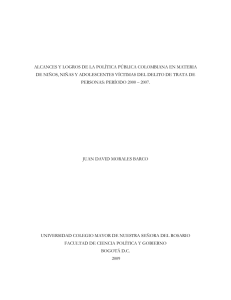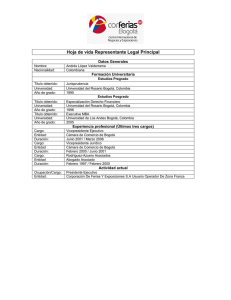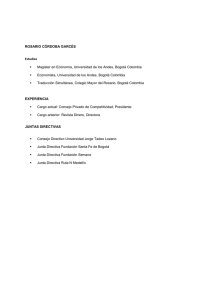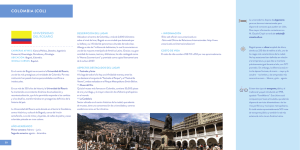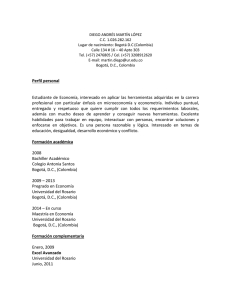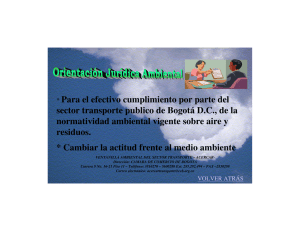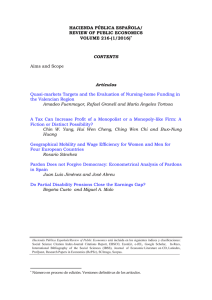Es desplazado toda personas que se ha visto forzada a migrar
Anuncio
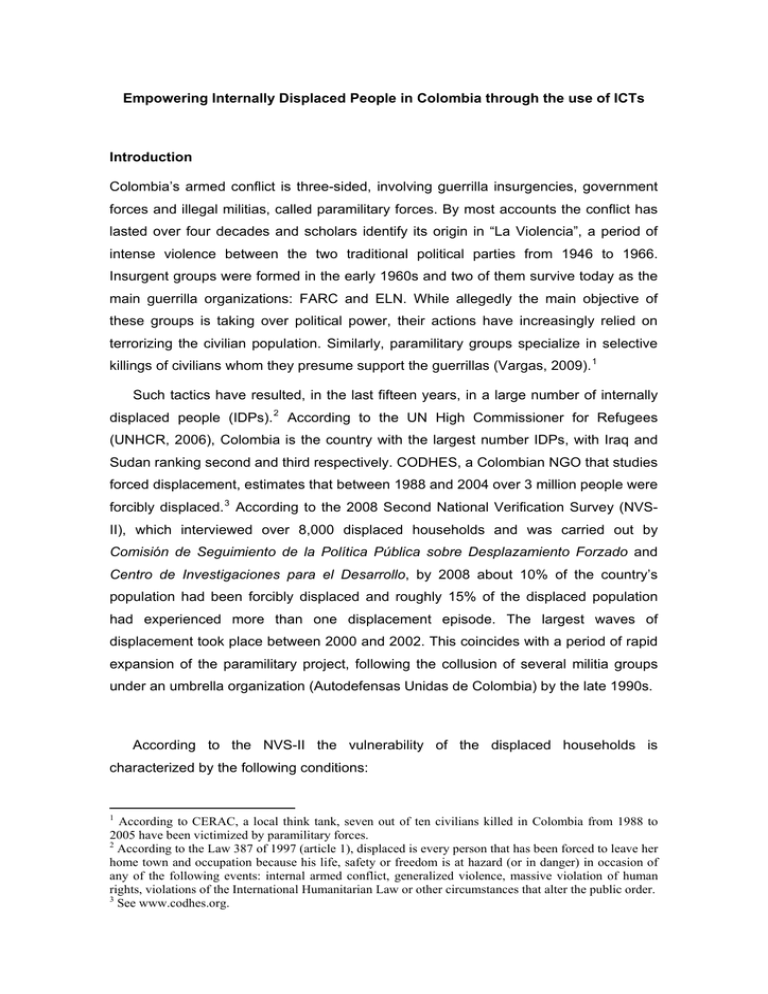
Empowering Internally Displaced People in Colombia through the use of ICTs Introduction Colombia’s armed conflict is three-sided, involving guerrilla insurgencies, government forces and illegal militias, called paramilitary forces. By most accounts the conflict has lasted over four decades and scholars identify its origin in “La Violencia”, a period of intense violence between the two traditional political parties from 1946 to 1966. Insurgent groups were formed in the early 1960s and two of them survive today as the main guerrilla organizations: FARC and ELN. While allegedly the main objective of these groups is taking over political power, their actions have increasingly relied on terrorizing the civilian population. Similarly, paramilitary groups specialize in selective killings of civilians whom they presume support the guerrillas (Vargas, 2009). 1 Such tactics have resulted, in the last fifteen years, in a large number of internally displaced people (IDPs). 2 According to the UN High Commissioner for Refugees (UNHCR, 2006), Colombia is the country with the largest number IDPs, with Iraq and Sudan ranking second and third respectively. CODHES, a Colombian NGO that studies forced displacement, estimates that between 1988 and 2004 over 3 million people were forcibly displaced. 3 According to the 2008 Second National Verification Survey (NVSII), which interviewed over 8,000 displaced households and was carried out by Comisión de Seguimiento de la Política Pública sobre Desplazamiento Forzado and Centro de Investigaciones para el Desarrollo, by 2008 about 10% of the country’s population had been forcibly displaced and roughly 15% of the displaced population had experienced more than one displacement episode. The largest waves of displacement took place between 2000 and 2002. This coincides with a period of rapid expansion of the paramilitary project, following the collusion of several militia groups under an umbrella organization (Autodefensas Unidas de Colombia) by the late 1990s. According to the NVS-II the vulnerability of the displaced households is characterized by the following conditions: 1 According to CERAC, a local think tank, seven out of ten civilians killed in Colombia from 1988 to 2005 have been victimized by paramilitary forces. 2 According to the Law 387 of 1997 (article 1), displaced is every person that has been forced to leave her home town and occupation because his life, safety or freedom is at hazard (or in danger) in occasion of any of the following events: internal armed conflict, generalized violence, massive violation of human rights, violations of the International Humanitarian Law or other circumstances that alter the public order. 3 See www.codhes.org. 1. A large household size: The average number of household members is 5.1, which represents one extra person compared with the average Colombian household. 2. A large proportion of female head of family: 43% of the displaced households have a female head of family (the national rate is 30%). 67% of these women do not have a partner and half of these households have children under 18 years old. 3. A relatively young population: 58% of the displaced population is under 20, which implies larger rates of economic dependency. 4. A high adult illiteracy rate: 20% of the household heads are illiterate. 5. Low returning rates: about 80% of IDPs do not return to their land. To mitigate such vulnerability, the Law 387 of 1997 created the Unique Registry of Displaced Population (RUPD, from its Spanish acronym). The aim of the RUPD is to have up-to-date quality information on the IDPs in order to create policies to target their specific needs. To be included in the RUPD, a person who considers herself displaced has to visit a specific government agency and file a report on the facts that precipitated her displacement within a year of the events. 4 Two weeks after filing her report the applicant can claim her RUPD number, which is only granted upon official assessment of the veracity of the story. Only after obtaining this number can a displaced household claim the benefits it is entitled to. These include immediate assistance to satisfy basic needs such as food, housing, healthcare and basic education for children in schooling age. However, the collection of the RUPD number is time consuming and costly. RUPD collection centers are often situated in far locations and tend to be overcrowded. The opportunity cost of collecting the RUPD number can be so high that a nonnegligible share of applicants never claims it, forgoing access to the benefits. Indeed, the Colombian Constitutional Court considers that the policies that target IDPs have Decree 2569 of 2000 (article 8). The law establishes that the filing has to be made personally. This generates non-negligible transaction costs for some households. Indeed, the NVS-II reports 28% of underregistry. That is, slightly less than a third of displaced households do not apply for government recognition of their status despite the potential benefits this may represent for them. 4 neither succeeded in mitigating the vulnerability of the displaced households, nor in granting their basic constitutional rights. 5 One of the main reasons that curb the effectiveness of policies target at IDPs is the limited access to RUPD numbers. Improvements in the delivery of RUPD numbers would result in improvements in the wellbeing of displaced households. This is the ultimate objective of the intervention we propose. In addition, such improvements would arguably benefit the government as well as the number of IDP-originated law sues will drop, reducing legal costs to the government. In addition, the relationship of the executive with the Constitutional Court will ease. In this context, the introduction of ICTs looks like an a priori cost-effective intervention to improve the timely provision of RUPD numbers and hence to overcome the main obstacle separating many IDPs from the set of benefits they are entitled to. Indeed, there are at least two important features of ICTs: First, everyone benefits from their functionalities in a cost-effective way, especially the so-called “digital literate”. Second, it allows to connect geographically disperse people at a low cost. In this sense, the introduction of ICTs could empower the IDPs in their relationship with the government by expanding their access to social benefits. It is worth noting; however, that the introduction of ICTs is not always successful. Cecchini and Scott (2003) evaluate four different experiences of introduction of ICTs intended to empower poor rural population in India. The authors conclude that in order to be successful at this task, a project should focus on a limited number of services. The experience of programs that offered a large number of services is that most of them end up unutilized because of lack of demand. Instead, the experiment proposed below intervenes in only one aspect of the relationship government-IDPs, which should have a sizable impact. Intervention Design We propose the implementation of a randomized experiment to assess whether ICTs are a cost-effective solution in the context described above. We think that two interventions should be implemented, involving two different ICTs, to be able to compare their relative cost-effectiveness and hence enhance the policy relevance of the experiment. 5 Sentence T 025 of 2004. The first intervention is the introduction of a webpage where applicants who have filed their displacement report can check the status of their process and ultimately get their RUPD number in case of approval. The second intervention involves an automatic alert message (SMS) sent to the registered cell-phone of the displaced household. 6 Our unit of analysis is the displaced household (which is also the unit to which RUPD numbers are allocated). Under our design, we will randomly assign the households into three different groups: 1. Treatment 1 – Web-based group: Upon filing their application households will be told a web-based system is being implemented whereby they can check their status online. Only the status of households under this treatment will be prompted on the website, advising other households to recur to the usual process and pick up their RUPD number in person. 7 2. Treatment 2 – Alert SMS: Once the RUPD number is approved, a text message will be sent to the registered cell-phone of the households assigned to this treatment. 3. Control Group – Status quo: Households assigned to this treatment will have to follow the regular procedure (i.e. show up in a collection center and wait to be assisted) to learn about the status of their process and eventually to get their RUPD number. Policy Potential We will follow up the implementation of our two treatments with ex-post surveys on the utilization of benefits discriminated by type of intervention (vis-à-vis the control group). This will allow us to assess the relative cost-effectiveness of different policies involving two different ICTs. The most effective intervention can subsequently be escalated to the whole set of IDPs, maximizing the prompt access of this population to the social benefits they have been denied by the armed conflict. 6 All displaced households interviewed in the NVS-II declared to have a cell-phone. Gamboa and Otero (2008) show that in Colombia the diffusion of cell-phones has reached a penetration level of over 90%. 7 Ideally one would like to make the randomization ex ante, and inform about the website only households belonging to treatment 1. This is however not possible since applying for an RUPD number does not guarantee its approval. A thorough revision of the veracity of the events reported by the applicant makes rejection rates fluctuate around 28%. In this sense, the aim of the experiment proposed here is to find cost-effective ways to enhance the delivery of the RUPD numbers that are assigned. Hence, randomization into treatments has to be posterior to government’s approval. Feasibility of Implementation and Data Collection It is of first order importance to mention that for this project, upon personal communication with high-ranked officials, we now have the full support and collaboration of Accion Social, the government agency responsible for social policy, which is in charge of the RUPD system, including the approval of applications and assignment of RUPD numbers. Accion Social’s interest to address the empowerment of IDPs through the introduction of ICTs in the formal delivery of RUPD numbers responds to the fact that the Constitutional Court has been closely monitoring the situation of the IDPs and has repeatedly requested their prompt access to social benefits. Additionally, the empowerment of IDPs may result in fewer lawsuits to the government for not complying with the delivery of social benefits. Possible limitations of our approach Gutierrez and Gamboa (2008) show that in Latin America education is an important aspect in explaining the access gap and use of four ICTs: telephone, mobile telephony, Internet and SMS. Therefore, the high illiteracy rate might be interpreted as a hazard to our design. However, the NVS-II reports at least one literate household member in every displaced household. Additionally the use of internet also requires a high investment in physical capital (hardware and software). Even if most displaced households do not own a PC, the incidence of internet cafes is widespread in the outskirt neighbourhoods of Bogota, where the median hourly rate is lower than the cost of a single bus ride. The Research Team For this project we are combining the efforts of the Research Group of the Economics Department at Universidad del Rosario, a leading research institution in Colombia, and the Comisión de Seguimiento a la Política Pública sobre el Desplazamiento Forzado a group of independent scholars with strong academic and public sector background who specialize in the problematic of IDPs in Colombia. There are three researchers from Universidad del Rosario, the CVs of whom are attached at the end of this document. Juan F. Vargas, the project leader, has a PhD in Economics and he is an expert on the Colombian armed conflict. Mariana Blanco has a PhD in Economics and she specializes in Behavioral and Experimental Economics. She has experience in the implementation of field experiments in Latin America (specifically Argentina) and is associated with the Latin America Field Experiments Network (LAFEN). Luis F. Gamboa is an economist with research experience in the role of ICTs in Economic Development, particularly in Latin America. There are two researchers from the Comisión de Seguimiento in our team, the CVs of who are also attached. Fernando Barberi is an economist who has participated in the design and implementation of the two National Verification Surveys on the displaced population, and advices the Comisión de Seguimiento in the analysis of public policies targeted at IDPs. Clara Ramirez is an expert on social policy. After working in the UNDP-funded Misión Social in the Ministry of Planning, she joined the Comisión de Seguimiento and participated in the design and implementation of the NVS-II, as well as in the analysis of its results. References Cecchini, S. and Schott, C. (2003). “Can Information and Communication Technology Applications Contribute to Poverty Reduction? Lessons from Rural India” Information Technology for Development, 10. pp. 73-8. Gamboa, L. and Otero, J. (2008). “An Estimation of the Pattern of Diffusion of Mobile Phones: the Case of Colombia” Documento de Trabajo 55, Facultad de Economia, Universidad del Rosario. Gutiérrez, L. and Gamboa, L. (2008). “An Approximation to the Digital Divide Among Low Income People in Colombia, México and Perú: Two Composite Indexes” Documento de Trabajo 39, Facultad de Economia, Universidad del Rosario. UNHCR (2006). 2005 Global Refugee Trends. Available at: www.unhcr.org/statistics. Vargas, J. (2009). "Military Empowerment and Civilian Targeting in Civil War" Documento de Trabajo 61, Facultad de Economia, Universidad del Rosario. Annex Juan F. Vargas Universidad del Rosario Calle 14 # 4-80 Casa La Buhardilla, O…cina 205 Bogota, Colombia Tel: 2970200 ext. 7828 [email protected] Education Ph.D. in Economics, University of London, June 2007 M.Sc. in Economics, Universidad de Los Andes, September 2003 B.A. in Economics, Universidad de Los Andes, March 2002 Professional Experience Assistant Professor of Economics, Universidad del Rosario, Bogota, 2008-present Visiting Assistant Professor, University of Calfornia, Los Angeles, 2007-2008 Visiting Fellow, Harvard University, 2005-2007 Research Assistant, Department of Economic Research, Central Bank of Colombia, 20012003 Research Assistant, Center for Economic Development Studies (CEDE), Universidad de Los Andes, 1999-2001 Honors and Awards Global Fellow, International Institute, UCLA, 2007-2008 Colombia’s Central Bank Scholarship for PhD in Economics, 2004-2007 Overseas Research Student Award Scheme (ORSAS), British Government, 2004-2006 Thomas Holloway Scholarship, Royal Holloway College, 2003-2006 Best Graduate Student Paper, European Science Days, Steyr, 2005 Research Publications “The Severity of the Colombian Con‡ict: Cross-Country Datasets Versus New Micro Data” Journal of Peace Research 43 (1): 99-115 (with J Restrepo and M Spagat) “The Dynamics of the Colombian Civil Con‡ict: A New Data Set” Homo Oeconomicus 21(2): 396-428, 2004 (with J Restrepo and M Spagat) “The Colombian Con‡ict: Who Did What to Whom? A Quantitative Approach 1988-2003” in Francisco Gutierrez (Ed.) Our Nameless War. Ed Norma-Vitral, Bogota. (in Spanish, with J Restrepo and M Spagat) Working Papers “Commodity Price Shocks and Civil Con‡ict: Evidence from Colombia”, 2007 (with O. Dube) Working Paper 2007-1, Weatherhead Center for International A¤airs, Harvard University, 2007. “Combatant Recruitment and the Outcome of War”, 2008 (with. A. S. Mahmud) (under review). Available at SSRN Working Paper # 1143211 "Military Empowerment and Civilian Targeting in Civil War", 2009. Documento de Trabajo # 61, Facultad de Economia, Universidad del Rosario. “The Work of Amnesty International and Human Rights Watch: Evidence from Colombia", 2007 (with A. Ballesteros, J. Restrepo and M. Spagat). CERAC Workin Paper #4. Other Publications "The Dark Side of the Force. In Memoriam, Jack Hirshleifer (1925-2005)" Webpondo.org, (in Spanish). "Understanding Civil Wars: We Need Better Data" Economists for Peace and Security Newsletter, December, 2004. “How Much do we Know About Civil Wars?” Webpondo.org, October-December, 2004, (in Spanish). "Violence and Growth in Colombia: A Brief Review of the Literature" Webpondo.org, January-March, 2004, (with A Riascos). Teaching Con‡ict and Civil War, Universidad del Rosario (Escuela Doctoral), spring 2009 Economics of Con‡ict, Universidad del Rosario, fall 2008 Principles of Economics, Universidad del Rosario, fall 2008 Economics of Developing Countries, International Development Studies Program, UCLA, winter 2008 & summer 2008 TA, The Political Economy of Africa (Gov-1197), Harvard University, spring 2006 TA, Financial Economics, Royal Holloway College, University of London, 2004-2005 TA, Economics Workshop, Royal Holloway College, University of London, 2004-2005 TA, Quantitative Methods, Royal Holloway College, University of London, 2003-2004 TA, Microeconomics, Universidad de Los Andes, 2002-2003 Other Editorial Activity Co-Editor. Webpondo.org (a Colombian web-based journal of academic opinion in social sciences), September 2004 –present Referee American Political Science Review, Journal of Development Studies, Journal of Peace Research, Desarrollo y Sociedad, Ensayos Sobre Politica Economica, Economia Institucional, Revista de Economia del Rosario, Colombia Internacional Papers in Conferences 10th Annual Conference of the Global Development Network (Natural Resources and Development), Arab Development Fund, Kuwait, February 3–5 2009. Fourth Annual Workshop of the Households in Con‡ict Network (HiCN), Yale University, December 5–6, 2008. LACEA/LAMES Annual Conference, IMPA, Rio do Janeiro, November 22nd-24th 2008 Causes and Consequences of Con‡ict, Social Science Research Center Berlin (WZB), March 28-29 2008 LACEA/LAMES Annual Conference, Universidad de los Andes, October 4th-6th 2007 Harvard-MIT-Yale Civil War Workshop, Harvard University, April 28 2007 Royal Economic Society 2007 Annual Meeting, Warwick University, April 10th-13th 2007 NYU-PRIO Workshop on Con‡ict, New York University. February 13th-14th 2007 Tenth Annual International Conference on Economics and Security. Thessaloniki, Greece. June 22nd-24th 2006 Annual Meeting of the European Public Choice Society. Durham, UK. March 31st-April 3rd 2005 Eighth Annual International Conference on Economics and Security. Bristol, UK. June 24th-26th 2004 Languages Spanish (native) English (‡uent) Italian (‡uent) German (intermediate level) Mariana Blanco Universidad del Rosario Calle 14 # 4-80 O…cina 207 Bogota, Colombia Tel: +57 (1) 2970200 ext. 7831 [email protected] Personal Details Date of Birth: June 4th, 1976 Place of Birth: Buenos Aires, Argentina Nationality: Argentina Education 2004 – 2008 Ph.D. in Economics, Royal Holloway College, University of London. Thesis title: Within-Subject Experiments on Other-Regarding Preferences 2003 – 2004 sity of London MSc in Political Economy (with Distinction), Royal Holloway College, Univer- 1994 – 1998 BSc in Economics (First Class Degree), Universidad de Buenos Aires Professional Experience 2008 – to date Assistant Professor of Economics, Universidad del Rosario 2007 – 2008 Visiting Researcher, International Institute, UCLA. 2006 – 2007 Visiting Researcher, Economics Department, New York University. Academic Honors and Awards Global Visiting Scholar, New York University, 2006 – 2007 ORSAS award, 2005 –2007 Thomas Holloway Scholarship, Royal Holloway College, University of London, 2004 – 2007 Departmental Assistantship, Department of Economics, Royal Holloway College, University of London, 2004 – 2007 British Chevening Scholarship, 2003 – 2004 (jointly founded with Royal Holloway College, University of London) Publications “Estimation on Health Expenditure –Argentina. Year 1997 and Projections 1998-2000.”National Ministry of Health. National Ministry of Economy. November, 2001 (Available in Spanish only) Working papers "Belief Elicitation in Experiments: Is There a Hedging Problem?” (with Dirk Engelmann, Alexander Koch and Hans Normann). Revise & Resubmit in Experimental Economics. "A within-subject analysis of other-regarding preferences” (with Dirk Engelmann and Hans Normann). "Piqueteros: an experimental analysis of direct vs indirect reciprocity" "An experimental test of Blame-Free Justice" (with Andrew Schotter and Bogachan Celen) Teaching August 2008 – to date Universidad del Rosario. Facultad de Economía Microeconomics I and Experimental Economics September 2004 – March 2006 Economics Department, Royal Holloway College, University of London Quantitative Methods for Economics I March 2002 – July 2003 Universidad de Buenos Aires. Facultad de Ciencias Económicas Macroeconomics and Economic Policy Work Experience February 2007 – March 2007 Centro de Investigación para Docencia en Economía y Desarrollo (CIDED), Universidad Nacional de Tres de Febrero Project: "Construyendo con…anza y capital social para reducir barreras de exclusión" Research Department - Inter-American Development Bank Collaborated with the research team that ran the experimental sessions in Buenos Aires. December 2001 – August 2003 Secretariat of Health –City of Buenos Aires Government –Inter-American Development Bank Programme of Institutional Support, Fiscal Reform and Investment Plan for the City of Buenos Aires. December 2001 – July 2003 Pan American Health Organization Research on the technical and political viability as to the implementation of Health Accounts at provincial level. September 2000 – July 2001 National Ministry of Health –Secretariat of Policies and Sanitary Regulation Project UNDP ARG/96/018 Policies and Health Insurance Regulations Project. March – August 2000 Secretariat of Health –City of Buenos Aires Government Adviser to the Undersecretary of Health Services February 1999 – March 2000 Hartneck Lopez & Co. Price WaterhouseCoopers Junior Economist- Auditing Department Curriculum Vitae Name: Date and Place of Birth: Phone Number : Fax: E-mail: Luis Fernando Gamboa N October 5 1973, Bogota - Colombia +(571) 2970200 ext. 631 (+571) 3 44 57 63 [email protected] [email protected] Address: Luis Fernando Gamboa Universidad del Rosario Clle. 14 # 4-69 Bogotá, Colombia Education Master of Industrial Economy. Universidad Carlos III(Madrid) 2004 Especialization in Transport Economics Universidad Carlos III(Madrid) 2004 Especialization in Energy Economics Universidad Carlos III(Madrid) 2004 Master in Economic Sciences Universidad Nacional 2000 Diploma in Uiversitary Docency Universidad del Rosario 1998 Bachellor in Economics Universidad del Rosario 1996 Professional Experience - Professor. Department of Economics Universidad del Rosario. (August 2004 to present.) - Assistantship at the Lemus Institute. Universidad Carlos III de Madrid. (España) (20032004.) - Referee of Revista de Economía del Rosario and Economic Analysis Working Papers EAWP. (2002-2003.) - Cordinator Microeconomics, Facultad de Economía Universidad del Rosario (January 1998June 1998) - Young researcher, Pontificia Universidad Javeriana, IPD, Konrad Adenauer Foundation. (March 1997- Ag. 1997) Teaching Experience Microeconomics (I, II, III) ,Principles of Economics. Research Interest: Social Policy (education and Welfare, Poverty, Industrial Organization Publications. Refereed Journal Articles Forero Nohora, Gamboa, L.F., (2007) Cambio en los retornos de la educación en Bogotá entre 1997 y 2003. Lecturas de Economía. No. 66. pp 225-250. Julio. Bravo, Leslie., Luis F Gamboa,. (2006) Subsidios Cruzados en el Sector Postal: Una aproximación. Revista de Economía Institucional Vol. 8. No. 15. pp. 251-268. Gamboa, Luis F. José Guerra. (2006). Una Evaluación Estática y Dinámica de los Cambios en Calidad de vida en Colombia durante 1997-2003. Revista de Economía del Rosario Vol. 9. No. 2. Diciembre p.p. 125 – 159. Gamboa, Luis F., (2005). Economía: ¿Racionalidad Sustantiva o Procesal?. Economía y Desarrollo. Vol. 4. No. 1. pp. 89-98. March Gamboa Luis F., A. Casas, Piñeros Luis J (2003). El Valor que Agrega la Escuela: Una Aproximación a la Calidad de la Educación en Colombia. Revista de Economía del Rosario. Vol 6. No 2. pp. 95-116. Casas A., Cortés, D., Gamboa, L.F. (2003) Las comparaciones interpersonales y la evaluación de estados sociales alternativos. Economía Institucional. No. 8. pp 147-160. Gamboa L. F., González J., Cortés D. (2000). “Algunas consideraciones analíticas sobre el estándar de vida”. Revista de Economía del Rosario. Vol. 3 No. 2 Bogotá. Cortés D., Gamboa, L. F. y González, J. I., (1999) "El ICV: Hacia una medida de estándar de vida" Coyuntura Social, N° 21, Fedesarrollo, november. Bogotá. Electronic Publications (refereed) Gamboa Luis F., Casas, A. (2002) La Propuesta de Sen: Una Aplicación a la Calidad de Vida en Colombia". Economic Analysis Working Papers. EAWP Vol. 1 No 13. ISSN 15791475 Gamboa Luis F (2004) Changes in the School effect in Colombia: A multilevel approach. Economic Analysis Working Papers. EAWP Vol. 3 No 6. ISSN 15791475 Working Papers Publicaciones electrónicas internacionales (con referee) Gamboa, Luis F. (2007). Patrones de acceso y análisis de gasto en Telefonía Móvil Celular en Colombia 2001-2006. DIRSI- IDRS. Gutiérrez, Luis H., L. F. Gamboa (2007) Oportunidades móviles. Pobreza y acceso telefónico en América Latina y el Caribe. El Caso de Colombia. DIRSI- IDRS. Disponible en http://www.dirsi.net/files/Colombia_ok.pdf Bravo, Leslie., Luis F. Gamboa, (2005). Subsidios Cruzados: el caso del sector postal. Borradores de Investigación. Facultad de Economía. UR. No. 65 May. Bogotá. Pena, Jorge., Luis F. Gamboa (2004). Productividad, eficiencia y tecnologías de la información y de la comunicación: aplicación empírica a la industria española. Borradores de Investigación. Facultad de Economía. UR. No. 60. December. Bogotá. Gamboa, Luis F. (2004). Uso estratégico de la deuda: Un estudio a nivel de empresa para Colombia durante 1995-2003. Borradores de Investigación. Facultad de Economía. UR. No. 59. November. Bogotá. Casas, A. Gamboa L. F. Piñeros L. J.,(2002) El Valor que Agrega la Escuela: Una Aproximación a la Calidad de la Educación en Colombia. Borradores de Investigación. Facultad de Economía. UR. No. 28 September. Bogotá. Casas, A. Gamboa Luis F. Piñeros Luis J.(2002) El efecto escuela en Colombia 1999 - 2000. Borradores de Investigación. Facultad de Economía. UR. No. 27 September. Bogotá. Gamboa, L.F. Casas A.F. (2002) Calidad De Vida a Nivel Regional: ¿Debemos Reconocer Las Diferencias?. Borradores de Investigación. Facultad de Economía. UR. No. 22 April. Bogotá. Gamboa L. F., González J., Cortés D. (2001). “ An aproximation to the standard of living index: The Colombia case”. Borradores de Investigación. Facultad de Economía. UR. No. 18 Bogotá. Gamboa, L.F. Casas A.F. (2002). Calidad De Vida: Una Medida Alternativa Para El Caso Colombiano. Borradores de Investigación No. 16. UR. Casas, Andrés, Cortes, Darwin, Gamboa, Luis (2001). “Desarrollo, bienestar y comparaciones interpersonales”, Borradores de Investigación No. 14. UR. Gamboa Luis F. (2000). “Una aproximación más a la relación existente entre Crecimiento y equidad”. Borradores de Investigación. Facultad de Economía. No. 11 UR. Gamboa, L. F., y Cortés D., (1999). “Una discusión en torno al concepto de bienestar”, Borradores de investigación, Facultad de Economía N° 1. Awards and Honors. • Liborio Zerda Excellence research award. Universidad del Rosario 2003. • Master Thesis with Honors. Grade: 5.0.Universidad Nacional de Colombia • Young research in Economics Award. Universidad Javeriana and Konrad Adenauer Foundation 1997 • Scholarship for outstanding performance at the Master in Economic Sciences. Universidad Nacional de Colombia. 1998 and 1999. Languages. Spanish and English fluently FERNANDO BARBERI GOMEZ FECHA DE NACIMIENTO: Diciembre 18 de 1947 CIUDAD: Bogotá DIRECCIÓN OFICINA: Carrera 6 No 34-62 piso 3 DIRECCIÓN ELECTRÓNICA: [email protected] TELÉFONO OFICINA: 2325666 Ext. 107 TELÉFONO CASA: 274 92 98 TELÉFONO CELULAR: 314 358 1550 IDIOMAS: Español, Inglés, nociones de francés ESTUDIOS Universidad Industrial de Santander, UIS Facultad de Ingeniería Eléctrica 1967 - 1968 (cuatro semestres). Universidad de los Andes, Facultad de Economía - Economista 1973. Center for Development of Economics Williams College -Massachusetts MA. Economic Development 1976 World Bank Institute Core Course Global Integration and the New Agenda, Washington 1999. ACTIVIDAD PROFESIONAL Consultor Privado Julio 2004 – hasta la fecha Ministerio de Relaciones Exteriores Asesor Canciller Temas Puntuales Marzo de 2004 hasta Julio de 2004 Colegio Mayor de Nuestra Señora del Rosario Director Posgrados de Economía, Asesor Vicerrectoría e Investigador Económico Enero de 1998 hasta Julio de 2004 Ministerio de Agricultura y Desarrollo Rural Asesor - Comercio Exterior - Ministro de Agricultura Enero 1998 - noviembre 1998 Fundación para las Investigaciones Agroeconómicas y Sociales FUNDAGRO - Director Octubre 1994 - diciembre 1997 Junta del Acuerdo de Cartagena Jefe Departamento de Comercio Junio 1993 - septiembre 1994 Araujo Ibarra y Asociados Ltda. Consultor Asociado Julio de 1991 - mayo de 1993 C.M.T. Consultores Asociados Socio Presidente septiembre 1985 - junio 1991 El Siglo Presidente Junio 1989 - agosto 1989 Asociación Nacional de Exportadores - ANALDEX Presidente Ejecutivo febrero 1985 - junio 1989 Asociación Nacional de Industriales - ANDI Vicepresidente de Asuntos Económicos agosto 1983 - diciembre 1984 Bolsa Nacional Agropecuaria Gerente General octubre 1982 - agosto 1983 Banco de la República Director Fondo Financiero Agropecuario - FFAjulio 1981 - septiembre 1982 Embajada de Colombia en Washington Consejero Económico noviembre 1980 - junio 1981 PROEXPO Subdirector General 1980 - 1981 Subdirector Financiero 1979 Asistente de la Dirección General 1978 Investigador Económico agosto 1971 - noviembre 1973 Fondo Monetario Internacional Western Hemisphere Departament. Economist noviembre 1976 - mayo 1977 FEDESARROLLO Investigador Económico mayo 1973 - junio 1973 junio 1976 a noviembre 1976, mayo 1977 a febrero 1978 Investigador y Gerente de Publicaciones enero 1974 - mayo 1975 ACTIVIDADES DESARROLLADAS EN LOS ÚLTIMOS DIEZ AÑOS Consultor Privado Comisión de Seguimiento a la Política Pública sobre el Desplazamiento Forzado- Diseño y planeación de las Encuestas Nacionales de Verificación tendientes a estimar el grado de observancia de los derechos de la población desplazada. Trabajo elaborado en conjunto con otros investigadores para la Corte Constitucional. 2007-2008. Comisión de Seguimiento a la Política Pública sobre el Desplazamiento Forzado Análisis de las políticas públicas para la población desplazada en materia de Vivienda, Salud, Participación, Generación de Ingresos y tierras. Trabajo elaborado en conjunto con otros investigadores para la Corte Constitucional. 2008 Comisión de Seguimiento a la Política Pública sobre el Desplazamiento Forzado Análisis de las políticas públicas para la población desplazada en materia de bla cuantificación de los bienes usurpados o forzados a dejar en abandono por la población en situación de desplazamiento forzado . Trabajo elaborado en conjunto con otros investigadores para la Corte Constitucional. 2009 Drummond Ltda.- Asesoría en diversos temas de orden financiero. 2008, 2007, 2006 2005 Conalgodón - Actualización Costos de Producción y Comercialización del Algodón Para las Cosechas del Interior 2005, 2006 y de la Costa- Llanos 2006 2005- 2006 .Quala Diseño de una estrategia a la luz de las normas de comercio exterior para reducir las importaciones de productos de la competencia 2005 y 2007.( en conjunto con la Doctora Silvia Anzola de González Planeta Paz – Evaluación de la Negociación Agropecuaria en el Tratado de Libre Comercio entre Colombia y los Estados Unidos – 2006 Asesor en asuntos de comercio exterior de Fedepalma 2006, Quala 2007- 2005 Fenalco 2005 Asocaña 2003-2001, Ministerio de Agricultura 2003, Protela 2002-2001, Cartón de Colombia 2002-2001, Fenavi 2002, Universidad del Rosario Director del Proyecto de Asesoría al Ministerio de Comercio Exterior en materia de la Negociación en Agricultura en el ALCA y OMC. Enero 2002 hasta Julio 2004. Asesoría en el Diseño de un Programa de Pregrado en Finanzas y Comercio Exterior. 2000. Asesoría en el Diseño de un Programa de Pregrado en Finanzas y Comercio Exterior. 2000 y diseño del Diplomado intitulado “ Visión Integral del Negocio de la Concesión”. 2001. Reforma estructura curricular de los Programas Académicos de las Especializaciones en Finanzas y Evaluación y Desarrollo de Proyectos de la Facultad de Economía – 2000 y Diseño de la Especializaciones en Comercio Exterior, Mercado de Capitales y Banca. 1999-2000 y elaboración de una propuesta para el diseño de una Especialización en Convivencia Participación y Seguridad Ciudadana. 1999. Director de las especializaciones en Finanzas y Evaluación de Proyectos EXPERIENCIA ACADÉMICA Universidad del Rosario - Director Proyectos de Grado de la Especialización en Evaluación y Desarrollo de Proyectos 1998 - 2001 Universidad del Rosario - Evaluador de diversos proyectos de grado de los alumnos de la Especialización en Evaluación y Desarrollo de Proyectos (1998 - 2001) Universidad del Rosario -Catedrático de la Especialización en Evaluación y Desarrollo de Proyectos y del Diplomado en Visión Integral del Negocio de la Concesión (2000) Universidad del Rosario - Catedrático (2000) Principios de Economía - Facultad de Economía - Universidad del Rosario PUBLICACIONES La Negociación Agropecuaria en el TLC: Alcances y Consecuencias. Planeta Paz, 2006. Verificando el Cumplimiento de los Derechos. Comisión de Seguimiento a la Política Pública sobre el Desplazamiento Forzado. 2008 El Agro Colombiano Frente al TLC con los Estados Unidos, Ministerio de Agricultura – 2004 Elementos para una estrategia de competitividad en el sector agropecuario colombiano. Ponencia presentada en el XXII Congreso Nacional Agrario (1995) Cuadernos de Desarrollo Agrícola, Vol. 1 Nos. 2 y 3 Marzo 1996 FERNANDO BARBERI GOMEZ C.C. 17.193.352 de Bogotá HOJA DE VIDA CLARA LEONOR RAMIREZ GOMEZ Datos personales Lugar de Nacimiento: Fecha de Nacimiento: Identificación: Dirección residencia: Teléfono: Email: Bogotá, Colombia Enero 8 de 1954 Cédula Ciudadanía 41.618.053 Carrera 28 No. 46-81. Apto. 301, Bogotá (57/1): 3451435 [email protected] Títulos Economista. Universidad Nacional de Colombia Bogotá, diciembre de 1978 Centre d' Etudes des Programmes Economiques, CEPE- Groupe des Ecoles Nationales d’Economie et de Statistique, INSEE- ENSAE Diplôme Paris, junio de 1985 Experiencia profesional - últimos 10 años Experta. Comisión de Seguimiento a la Política Pública sobre el Desplazamiento Forzado. Análisis de la II Encuesta Nacional de Verificación, en los aspectos de características sociodemográficas de los desplazados, características educativas, condiciones laborales y generación de ingresos. Análisis de la situación de las familias, las mujeres, niños y niñas y población afrocolombiana. Diciembre de 2008febrero de 2009 Consultora. Centro de Investigaciones para el Desarrollo CID- Universidad Nacional de Colombia. Dirección de la II Encuesta Nacional de Verificación de los Derechos de la Población Desplazada- 2008. Mayo de 2008-noviembre 2008. Consultora. Proyecto COL/98/015 de la Alcaldía Mayor de Bogotá y el Programa Naciones Unidas para el Desarrollo, PNUD. Febrero 15 de 2004- diciembre de 2007 Contralora Delegada para el Sector Social. Contraloría General de la República. Bogotá, Octubre de 2002 a febrero 2 de 2004. Consultora del Programa Nacional de Desarrollo Humano. Departamento Nacional de Planeación y Programa Naciones Unidas para el Desarrollo, PNUD. Mayo 2001hasta septiembre de 2002. Y marzo de 2008 a octubre de 2008 Hoja de Vida. Clara Leonor Ramírez Gómez Consultora de la Misión Social. Departamento Nacional de Planeación y Programa Naciones Unidas para el Desarrollo. Como coordinadora de estudios de pobreza – en estos dos programas- participó, principalmente, en la definición y estimación de índices de condiciones de vida, de pobreza y de desigualdad a nivel nacional, departamental y municipal; en la coordinación del grupo técnico institucional que diseñó, probó y aplicó la Encuesta de Calidad de Vida de 1997, realizada por el Dane; en la coordinación y análisis de la misma encuesta; en la dirección de los Informes de Desarrollo Humano para Colombia, 1998, 1999 y 2000 y en la presentación de propuestas y coordinación de observatorios sociales regionales. Diciembre de 1995, Abril 2001 Investigadora asociada del Centro de Investigaciones para el Desarrollo, CID, de la Universidad Nacional de Colombia. Abril 15 a Septiembre 15 de 2002 Directora del Observatorio de Coyuntura Social, abril 2001- Enero 2002. Directora de la investigación “Programas y políticas de capacitación para jóvenes en condición de pobreza”. Julio de 1998 a Junio de 1999. Publicaciones – Últimos 10 años “La política social en la Bogotá Sin Indiferencia” Secretaría Distrital de Desarrollo Económico- Alcaldía Mayor de Bogotá. Imprenta Distrital, Bogotá D.C., diciembre de 2007. ISBN 978-958-717-015-3. Coautora (Con Consuelo Corredor M y Alfredo Sarmiento G.) “Desarrollo social, prestación de servicios sociales y renta básica” en: Economía Colombiana No. 310, septiembre- octubre 2005. Revista de la Contraloría General de la República. Páginas 45 a 56. Imprenta Nacional. Bogotá, 2005. ISSN 0104998 “Elementos para el diseño de una política social integral”. Capítulo 1 del Plan Estratégico 2004-2008. Departamento Administrativo de Bienestar Social del Distrito Capital. Páginas 19 a 39. Ed. Antropos, Ltda. Bogotá, 2005. ISBN: 958-8223-4 “Sistema General de Salud: afiliación, atención y equidad”” en: Economía Colombiana No. 303, julio-agosto de 2004. Revista de la Contraloría General de la República. Páginas 28 a 33. Imprenta Nacional. Bogotá, 2005. ISSN 01204998 “Evaluación de la Política Social 2003” Contraloría General de la República. Coordinadora del informe (con L. B. Flórez y M. Rivera). Imprenta Nacional, Bogotá. 2004 “Persistir en la paz negociada. Análisis del contexto socio económico y político del conflicto en Colombia” Comisión de conciliación Nacional/ Konrad Adenauer Stiftung. Ediciones Antropos, Bogotá. 2003. Coautora (Con A. Martínez y E. Borda( 2 Hoja de Vida. Clara Leonor Ramírez Gómez “Diez años de Desarrollo Humano en Colombia” PNUD, DNP, ACCI, PDH. Alfaomega Colombiana S. A., Bogotá, 2003. Coautora “Reflexiones en torno a la distribución del ingreso, el crecimiento y el gasto público. Universidad Externado de Colombia. Estudios de caso en políticas publicas No.4, Bogotá, 2003. Coautora (Con A. Sarmiento y J. I. González) “Desplazamiento forzado interno en Colombia” Boletín No. 12 del Observatorio de Coyuntura Socio Económica. OCSE. CID- FCE-UN- UNICEF, septiembre de 2003 “Panorama laboral Colombiano: alto desempleo, ingresos precarios”. Boletín No. 11 del Observatorio de Coyuntura Socio Económica. OCSE. CID- FCE-UN- UNICEF, marzo de 2002 “Informe de Desarrollo Humano para Colombia, 2000”. Co-directora. Alfa-Omega Editores, Bogotá: 2001 “Juventud, Pobreza y formación”, Unibiblos, Bogotá, 2000, Coautora. “Educación y fuerza de trabajo”, Boletín SISD 27, Coautora. Bogotá: DNP 2000. Quebecor/Impreandes Colombia S.A. “Coyuntura económica e indicadores sociales”, Boletín SISD 26, Coautora. Bogotá: DNP 2000. Quebecor/Impreandes Colombia S.A. “Informe de Desarrollo Humano para Colombia, 1999”. Co-directora. Bogotá: Tercer Mundo Editores, 2000 “Programas de capacitación para jóvenes en condiciones de pobreza. El caso de Bogotá, Colombia” en: Gallart, M.A. (Coord.) Formación, pobreza y exclusión: los programas para jóvenes. Montevideo: CINTERFOR/OIT 2000 “Población e indicadores sociales”. En Misas, Gabriel (editor). Desarrollo Económico y Social en Colombia Siglo XX. Bogotá: Unibiblos, Universidad Nacional, 2001, pag 481 -514 3
